- Details
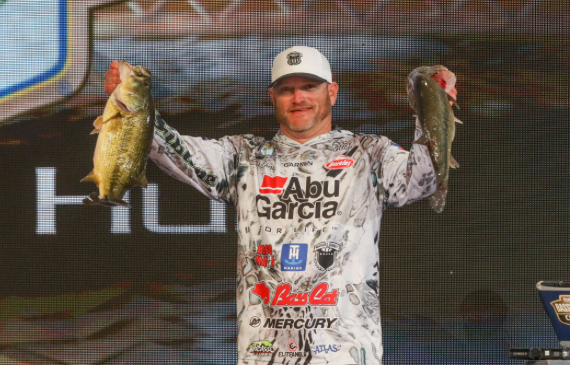 Hank Cherry, of Lincolnton, N.C., is leading after Day 1 of the Academy Sports + Outdoors Bassmaster Classic presented by Huk with 29 pounds, 3 ounces. - Photo by Gary Tramontina/B.A.S.S.
Hank Cherry, of Lincolnton, N.C., is leading after Day 1 of the Academy Sports + Outdoors Bassmaster Classic presented by Huk with 29 pounds, 3 ounces. - Photo by Gary Tramontina/B.A.S.S.
Hank Cherry, of Lincolnton, N.C., is leading after Day 1 of the Academy Sports + Outdoors Bassmaster Classic presented by Huk with 29 pounds, 3 ounces. - Photo by Gary Tramontina/B.A.S.S.
BIRMINGHAM, Ala. — Halfway through Day 1 of the Academy Sports + Outdoors Bassmaster Classic presented by Huk, North Carolina pro Hank Cherry fell and injured his right arm.
For a moment, he thought it might even be broken.
But Cherry powered through the pain — and with only one good arm, he caught five bass that weighed 29 pounds, 3 ounces to take the lead at the 50th edition of the Super Bowl of Professional Bass Fishing. Competition is taking place on Lake Guntersville with weigh-ins at the Birmingham-Jefferson Convention Complex.
Cherry said his injury, which occurred as he was reaching down to grab a fish, would likely require a visit to a local doctor — but it wouldn’t keep him from fishing Saturday morning.
“I didn’t expect to catch them like this at all,” Cherry said. “What I caught my fish on was actually plan B. But it’s plan A now, for sure.”
Believing the location and structure he was fishing were the real key to his success, Cherry made no secret of the bait he was using. He said he started with a lipless crankbait, but the high winds kept a loop in his line and made it hard for him to maintain proper contact with the bait.
“That’s why I switched to a bladed jig,” he said. “It just made more sense for the conditions we were fishing, and it turned out to be the perfect choice.”
- Details
Z-Man Report
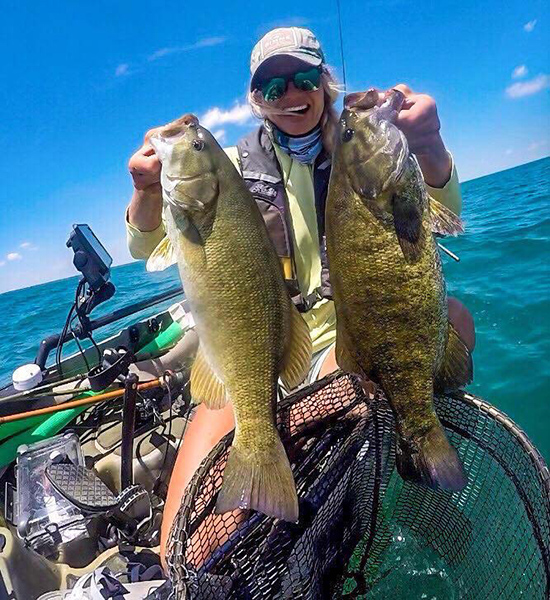 Kristine Fischer, tournament champion and the newest member of Z-Man’s influential pro-staff
Kristine Fischer, tournament champion and the newest member of Z-Man’s influential pro-staff
“For a kayak angler like me, the resilience of ElaZtech baits are a dream come true,” acknowledges Kristine Fischer, tournament champion and the newest member of Z-Man’s influential pro-staff.
Fischer, an emerging angling rockstar who won the 2019 Hobie Bass Open at Kentucky Lake, admits to catching big bass on Z-Man soft plastics and ChatterBait® Bladed Jigs well before she ever met the folks behind the popular fish-catching baits.
“I’m a power fisherman first, and a Z-Man ChatterBait JackHammer™ helped me cash my first check in a national bass tournament,” notes the Weeping Water, Neb. native, who now travels and fishes across America with her fiancé AJ.
“Kristine is a talented and diehard angler who has a habit of staying on the water longer than anyone else,” says Z-Man pro staff and promotions manager Joey Prochazka. “Not only does she effectively represent the kayak fishing community—who were early adopters of our ElaZtech baits—Kristine is also a dedicated ice angler and muskie hunter, truly a trailblazer.”
During her travels, which include an impressive 25 tournament stops from California to Georgia, Fischer has added finesse tactics to her bag of tricks.
“The nationwide phenomenon of Z-Man finesse baits extends well beyond their attraction to smallmouth and largemouth bass,” she says. “The fact I can confidently grab a single bag of Hula StickZ™ or TRD CrawZ™ and know that six baits will be more than enough for a day—or even a week—of fishing is a huge advantage for a kayak angler.”
Fischer believes minimizing the tackle inventory in her Hobie Pro Angler is a time-saver as well as a necessity.
“For us, it’s all about packing light and keeping hot baits at our fingertips. I can easily fish a two-day tournament on one bag of Finesse TRD®s or DieZel MinnowZ™, while other brand baits might get torn up after a few bites and require me to carry five extra bags. Actually, I’d probably carry ElaZtech baits regardless, because their buoyancy, action and knack for scoring big bites just excels.”
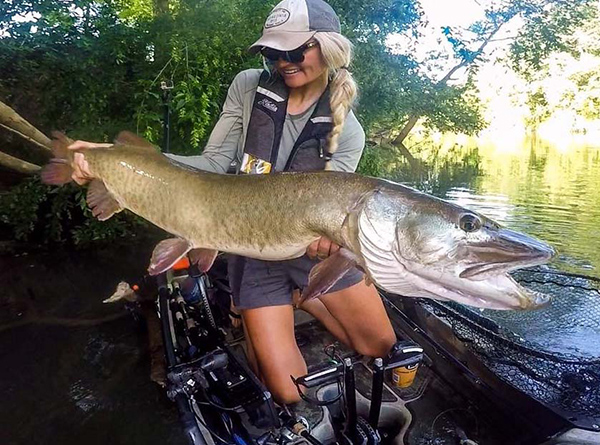 Kristine Fischer, tournament champion and the newest member of Z-Man’s influential pro-staff
Kristine Fischer, tournament champion and the newest member of Z-Man’s influential pro-staff
Fischer, who aspires to eventually compete on one of the “big boat” bass tours, has been a revelation and an inspiration to other women following her career as a tournament-winning kayak angler.
“All the years I’ve been fishing I’ve never wanted to be singled out as a female angler,” she admits. “Honestly, I’ve just wanted to blend in with the rest of the competitive anglers and be respected as an angler and not have any extra accreditations that come with being a rarity in the sport. This past year, though, I’ve had so many women reach out and tell me how inspiring this is. So, I realize it’s not necessarily about me, but perhaps about something much bigger.”
Adds Prochazka: “Giving a voice to all female anglers is important to Z-Man because women are a legitimate and underserved part of our industry. We wanted to help give other women someone to root for in the angling community.
“We didn’t rush into this,” he continues. “But as we worked out the details it became abundantly clear that Kristine was so much more than a smiling face. She’s a cerebral angler with a high motor who’s also very selective and analytical about her decisions. No doubt, everyone in our office is absolutely thrilled to welcome Kristine aboard. She’s a super-driven angler, a terrific person and someone who gets things done.”
Fischer echoes the advice she often shares with fellow female anglers: “Admittedly, competitive kayak fishing can be an intimidating sport. It’s male-dominated and something you don’t see a lot of women excelling in because there just aren’t that many of us. But if you are truly passionate about something, go out there and do it with every single bit of your being— and if you believe in yourself, you will succeed.”
- Details
FLW Report
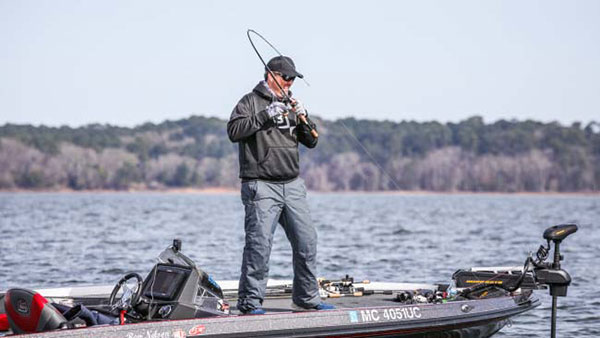 Ron Nelson
Ron Nelson
Ron Nelson of Berrien Springs, Mich. finished fifth in the Tackle Warehouse Pro Circuit at Sam Rayburn, Tex. last week.
Nelson caught 20 bass that weighed 57-5 and won $19,000, bringing his career FLW winnings in 55 FLW related events to $403,665. This is second season at the high level Tackle Warehouse Pro Circuit.
The reigning Polaris Rookie of the Year found an offshore ledge just south of Cassels-Boykin where he caught fish every cast for hours. As fun as it was, the spot ended up being both a blessing and a curse.
“Once you catch 12 pounds, you need a big bite,” says Nelson, who actually had a different spot he’d start at each morning to catch a quick limit on a shad-colored Keitech Swing Impact FAT on a 1/4-ounce head. “Guys here say you can catch 2-pounders all day and then catch a 7 or an 11 off the same school. So, I’m like, I’ll just keep on having fun and hoping that happens.”
Unfortunately, all Nelson got for his efforts was sore hands from all the 2-pounders he caught. Though, it wasn’t from lack of trying for kickers, as he cycled through numerous presentations in hopes of coaxing a bigger bite.
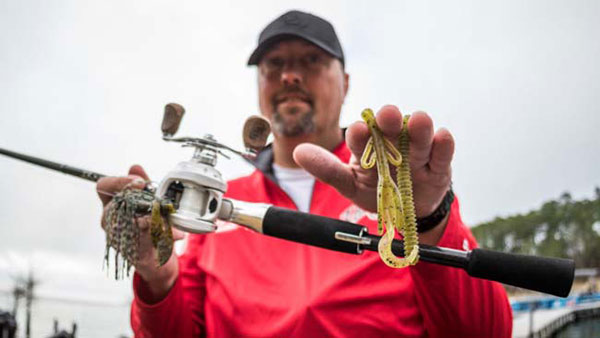 Ron Nelson
Ron Nelson
“You’d throw that Carolina rig out and they’d bite right away,” explains Nelson, who put a Zoom Brush Hog or Zoom Double Ringer on his rig. Every time I caught one, the graph would just light up. There’d be 15 following that fish up. I’d throw a spoon down. They’d all leave. I’d try a big swimbait, but they wouldn’t eat that. I’d toss a jig, and they’d barely touch it. But if I threw that rig, it’d be ‘there’s another one; there’s another one.’”
When he got tired of catching cookie cutters, he did have a big-bite pattern that he went to each day, which was punching “topped out, floating hyacinth mixed with other floating grass” in the back of pockets with a Reaction Innovations Sweet Beaver (hematoma). That produced his biggest bites on day one, and he lost a giant on day three doing that.
- Details
Ranger Report
Ranger Cup, a tournament contingency program for competitive anglers, will be even stronger in 2020 thanks in part to a new program just announced for BFL anglers.
Beginning with the first event on Sam Rayburn on January 4, anglers running Ranger boats will have more opportunity than ever to take home bonus money from the legendary boat builder.
For all 2020 regular season events, any angler that wins a BFL tournament and meets Ranger Cup criteria will be awarded a $5,000 bonus, representing a significant increase over past years. The enhanced program doesn't stop there. Ranger is adding a highest finisher guarantee for 2020 events as well. In the case a Ranger angler doesn't win the event, a $1,000 bonus will be paid to the highest finishing angler meeting Ranger Cup criteria.
"To date, more than $19 million has been paid out in bonus money to Ranger owners who have participated in Ranger Cup," said Ranger Sr. Marketing Promotions Manager Scott Arms. "That's more than the awards of all other competitive programs combined, and we are thrilled to make an even stronger commitment to our family of anglers in 2020."
"We've also got even more exciting news on the horizon," Arms added "Ranger anglers definitely don't want to miss signing up for this year's program."
Specific details and sign up information are available at Rangercup.com, which is now accepting 2020 entries. With so much opportunity at numerous competitive levels, Ranger boat owners are encouraged to sign up now to make the most of every event.
In addition to all regular season BFL events, Ranger Cup payout will continue to be available for the BFL All American. 2020 will offer strong bonuses for both pro-and co-anglers at the prestigious event with a $20,000 top prize available for those fishing on the pro division, as well as further incentives for 2nd-5th place, and a $5,000 top prize available on the co-angler division with additional payout available for 2nd-5th place co-anglers as well. Full details and 2020 registration links are available on Rangercup.com.
- Details
Phoenix Report
 Phoenix Bass Boats
Phoenix Bass Boats
Phoenix Boats announced the creation the new FLW PHOENIX BONUS for the 2020 FLW Tournament season.
The FLW PHOENIX BONUS program is designed to reward Phoenix Boat owners for their performance in Phoenix Bass Fishing League (BFL), FLW Pro Circuit and FLW Series events. This extends the recently announced partnership where Phoenix Boats became the exclusive boat sponsor of FLW to bring more opportunities to the anglers. The payouts in this exciting new program are substantial making it one of the best contingency programs in tournament bass fishing.
The FLW PHOENIX BONUS costs $19.95 to register and anglers will receive a Phoenix decal and membership card. The FLW PHOENIX BONUS is an independent program and separate from Phoenix First Flight, and while some guidelines will crossover between the two programs, they are not one and the same. In addition to higher payouts for Phoenix Bass Fishing League and FLW Series tournaments, the FLW PHOENIX BONUS program will also be paying the highest qualified finishing Phoenix Boat owner if the winner of the tournament is not a qualified Phoenix Boat owner.
Sign-up, rules, guidelines, and payouts can be found at PhoenixBassBoats.com.




